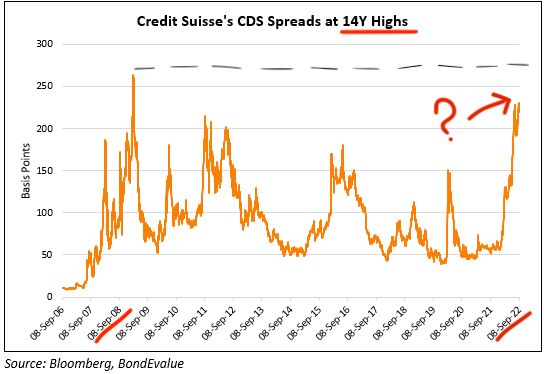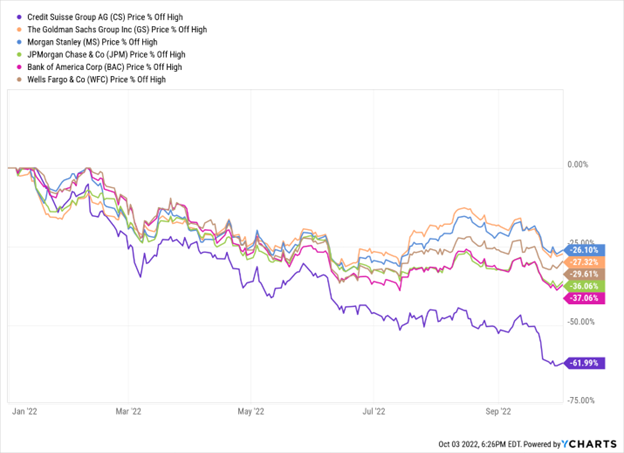On Sunday, ABC Australia reported that a "major international investment bank is on the brink," citing a credible source.
And everyone on Wall Street knows who they're talking about…
So, who are they talking about? Will that bank actually blow up like Lehman Brothers? Will its blow-up spark a broader financial contagion that crashes the stock market by 40%? And how should you be positioning your portfolio right now?
Let's answer all those questions and more.
Who Is on the Brink?
The major international investment bank that is on the brink, according to ABC Australia, is Credit Suisse (CS).
Credit Suisse has been struggling for about a year now. The bank had significant exposure to Archegos, the highly-leveraged hedge fund that blew up in epic fashion mid-2021. It also had major exposure to Greensill, the fintech disruptor that purported to make financing fairer, which itself imploded in March 2021.
Those two crises cost Credit Suisse billions and put the bank on very unsure footing heading into 2022.
Then the bond markets went crazy. Across North America and Europe this year, government bond yields have soared in a way they've never soared before. That's problematic because it has injected unprecedented volatility into traditionally stable government bond markets. Banks – like Credit Suisse – count on traditionally stable markets to stay balanced. When they get hit with long-lasting unprecedented volatility, bank trading models tend to break.
A well-capitalized bank can handle those breaks. But a struggling bank cannot. Credit Suisse was deeply damaged coming into 2022. Apparently, it is now struggling to just stay above water.
The bank's credit default swap spreads have just hit their highest levels since the depths of the 2008 financial crisis. That means that the market believes the odds of Credit Suisse going bankrupt today are as high as they were back in late 2008 – when investors thought the entire global financial system was going to collapse.

We are not going to argue with Mr. Market here. While the odds of a Credit Suisse insolvency event are still below 50% (and even below 30%), the odds are high enough for us to factor this risk into our investment decision-making calculus.
So… what happens to the markets if Credit Suisse goes belly-up?
Will a Credit Suisse Collapse Crash the Markets?
The spookiest thing about the potential insolvency of a major investment bank is that nobody really knows what will happen afterward.
The investment banking and financial derivatives world is a giant "black box." We don't really know what these banks are doing with their risk. And that was the problem in 2008 – all these seemingly unrelated banks were holding each other's risk, so when one blew up, almost all of them did.
That still could happen today. But it is unlikely.
Since 2008, a series of legal measures have been put in place – especially in the U.S. – to restrict the risk of a financial contagion spreading throughout the banking system. That's why the Fed regularly runs stress tests on all the major U.S. banks.
The banks have consistently passed and continue to pass those tests.
That's because they are much better capitalized today. They have much less systemic risk exposure and better risk management practices than they did in 2008.
Therefore, the consensus belief on Wall Street is that a potential Credit Suisse insolvency event would undoubtedly hurt the entire financial system. But it wouldn't put everyone else on the brink, too.
That's why most major Wall Street banks have seen their stocks decline "only" 25% to 35% in 2022, versus a 60%-plus meltdown in Credit Suisse stock.

Still, while a potential repeat of 2008 likely isn't on the table, a potential deeper drop in stocks still is.
No comments:
Post a Comment